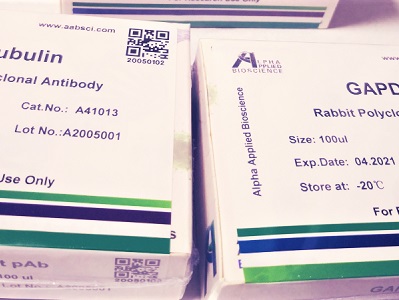

SHIP-1 (phospho Tyr1021) rabbit pAb
Cat :A21501
-
Source
Rabbit
-
Applications
WB,ELISA
-
Reactivity
Human,Mouse,Rat
-
Dilution
WB: 1:500 - 1:2000. ELISA: 1:40000. Not yet tested in other applications.
-
Storage
-20°C/1 year
-
Specificity
Phospho-SHIP-1 (Y1021) Polyclonal Antibody detects endogenous levels of SHIP-1 protein only when phosphorylated at Y1021.
-
Source/Purification
The antibody was affinity-purified from rabbit antiserum by affinity-chromatography using epitope-specific immunogen.
-
Immunogen
The antiserum was produced against synthesized peptide derived from human SHIP1 around the phosphorylation site of Tyr1021. AA range:987-1036
-
Uniprot No
Q92835
-
Alternative names
INPP5D; SHIP; SHIP1; Phosphatidylinositol 3; 4,5-trisphosphate 5-phosphatase 1; Inositol polyphosphate-5-phosphatase of 145 kDa; SIP-145; SH2 domain-containing inositol 5'-phosphatase 1; SH2 domain-containing inositol phosphatase 1; SHIP-1;
-
Form
Liquid in PBS containing 50% glycerol, 0.5% BSA and 0.02% sodium azide.
-
Clonality
Polyclonal
-
Isotype
IgG
-
Background
inositol polyphosphate-5-phosphatase D(INPP5D) Homo sapiens This gene is a member of the inositol polyphosphate-5-phosphatase (INPP5) family and encodes a protein with an N-terminal SH2 domain, an inositol phosphatase domain, and two C-terminal protein interaction domains. Expression of this protein is restricted to hematopoietic cells where its movement from the cytosol to the plasma membrane is mediated by tyrosine phosphorylation. At the plasma membrane, the protein hydrolyzes the 5' phosphate from phosphatidylinositol (3,4,5)-trisphosphate and inositol-1,3,4,5-tetrakisphosphate, thereby affecting multiple signaling pathways. The protein is also partly localized to the nucleus, where it may be involved in nuclear inositol phosphate signaling processes. Overall, the protein functions as a negative regulator of myeloid cell proliferation and survival. Mutations in this gene are associated with defects and cancers of the immune system. A
-
Other
INPP5D, Phosphatidylinositol 3,4,5-trisphosphate 5-phosphatase 1
-
Mol.Wt (Da)
133193
-
Concentration
1 mg/ml
| Product | Reactivity | Applications | Conjugation | Catalog | Images |
|---|
-
 400-836-3211
400-836-3211
-
 support@aabsci.com
support@aabsci.com
-
β-actin rabbit pAb ...... >
-
β-actin rabbit pAb(A284) ...... >
-
Plant-actin rabbit pAb ...... >
-
β-tubulin mouse mAb(M7) ...... >
-
GAPDH mouse mAb(2B8) ...... >
-
GAPDH mouse mAb(PT0325) ...... >
-
Histone H3 rabbit pAb ...... >
-
Histone H3 rabbit pAb ...... >
-
COX IV mouse mAb(6C8) ...... >
-
GFP-Tag mouse mAb(1G6) ...... >
-
HA-Tag mouse mAb(1B10) ...... >
-
mCherry-Tag mouse mAb(6B3) ...... >










 400-836-3211
400-836-3211
